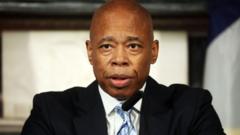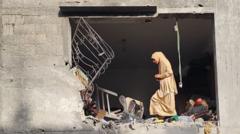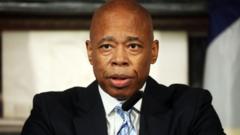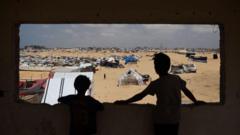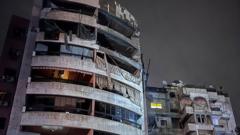In a recent statement, Israeli Prime Minister Benjamin Netanyahu decried an ongoing police investigation into potential links between his closest aides and Qatar as a politically charged "witch hunt." The investigation, which has seen two of Netanyahu's associates arrested, intensifies amidst growing protests in Israel over his controversial policies, including the treatment of hostages and judicial reforms.
**Netanyahu Denounces Qatar Probe as Political Witch Hunt Amid Escalating Tensions**
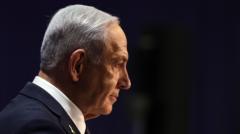
**Netanyahu Denounces Qatar Probe as Political Witch Hunt Amid Escalating Tensions**
Israeli Prime Minister Benjamin Netanyahu stands firm against police investigation into his aides with alleged Qatar ties, labeling it a politically motivated attack.
Netanyahu's denouncement came after his aides, Yonatan Urich and Eli Feldstein, were taken into custody under suspicion of receiving illegal payments from Qatari officials and engaging in various corrupt practices. He claims their arrests are without merit, viewing them as hostages in an attempt to undermine his government. His remarks were underscored by fears of political motives behind the investigation, amid his existing legal battles concerning corruption charges.
The ongoing tensions are compounded by widespread demonstrations within Israel, aligning against Netanyahu's hardline policies and the government's military strategy in Gaza, where Qatar has played a crucial mediation role. A Qatari official responded to the investigation, suggesting it reflects a smear campaign aiming to destabilize Qatar's contributions as a mediator in the Israel-Hamas conflict.
Netanyahu's situation has raised significant media scrutiny, especially since his government has historically permitted financial aid from Qatar to support the Gaza Strip's population—a decision that has been met with sharp criticism for potentially bolstering Hamas. As police continue their inquiry, the fallout remains uncertain, with implications for the broader geopolitical landscape in the Middle East and Netanyahu's political survival.
In closing, critics of the investigation maintain that it is an attempt to delegitimize Netanyahu and the right-wing government he leads, while supporters argue it is a critical examination of corruption within the political sphere. The outcome of this investigation may redefine the balance of power as Netanyahu navigates an increasingly fractious political landscape in Israel.
The ongoing tensions are compounded by widespread demonstrations within Israel, aligning against Netanyahu's hardline policies and the government's military strategy in Gaza, where Qatar has played a crucial mediation role. A Qatari official responded to the investigation, suggesting it reflects a smear campaign aiming to destabilize Qatar's contributions as a mediator in the Israel-Hamas conflict.
Netanyahu's situation has raised significant media scrutiny, especially since his government has historically permitted financial aid from Qatar to support the Gaza Strip's population—a decision that has been met with sharp criticism for potentially bolstering Hamas. As police continue their inquiry, the fallout remains uncertain, with implications for the broader geopolitical landscape in the Middle East and Netanyahu's political survival.
In closing, critics of the investigation maintain that it is an attempt to delegitimize Netanyahu and the right-wing government he leads, while supporters argue it is a critical examination of corruption within the political sphere. The outcome of this investigation may redefine the balance of power as Netanyahu navigates an increasingly fractious political landscape in Israel.

